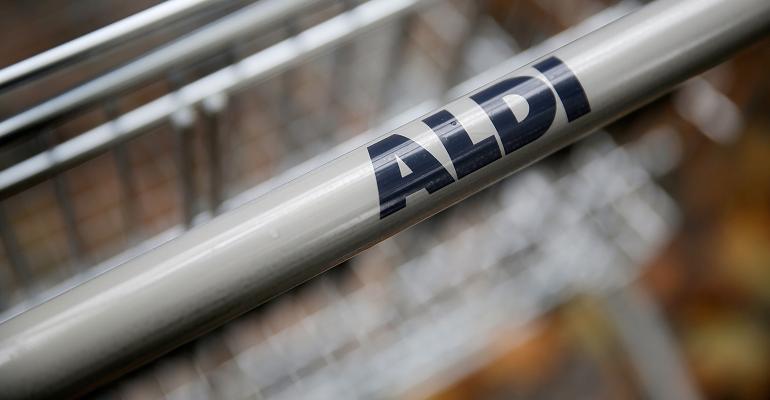Aldi is responding to Walmart’s aggressive price cuts by expanding its offering of private label products and adopting a more flexible pricing strategy that will help it maintain its price leadership position, according to a Reuters report.
The German-owned retailer, which earlier this year unveiled a $1.6 billion remodeling effort to expand its perishables assortments and modernize its layouts, is also continuing an aggressive expansion strategy, with 400 new store openings planned by the end of next year. Many of those outlets will be in Florida, Texas and along the East and West Coasts.
Jason Hart, CEO of Aldi’s U.S. division, based in Batavia, Ill., told Reuters that Aldi’s internal price surveys show it with a 21% price advantage over Walmart — an advantage he is seeking to maintain. However, Reuters’ price surveys in five Midwestern cities where Walmart has undertaken a test of price reductions found that Walmart was about 5% to 10% cheaper for a basket of about 15 grocery items.
Aldi’s remodeling strategy will expand its capacity to merchandise more private-label products in certain fast-growing categories, including perishables, the Reuters article reported.
Liz Ruggles, an Aldi spokeswoman, said in a statement to SN, “More than 40 million shoppers each month trust us to deliver the highest quality foods at the lowest prices. From organic and gluten-free options, to antibiotic-free meats and cage-free eggs, we focus on providing our customers consistency, simplicity and most importantly, the products they want.”
Aldi’s strategy, combined with Walmart’s testing of sharp price cuts, its own focus on private label and the anticipated incursion of Lidl, another German discounter eyeing a rapid rollout in the U.S., will likely exacerbate pricing pressures on traditional retailers, analysts said.
“This will really shake up the industry, because Aldi has always been known as the low-price leader, and it appears they will not be undercut by Walmart,” said Jon Hauptman, senior director, retail, at consulting firm Willard Bishop, an Inmar Analytics company. “They are going to neutralize any potential vulnerability against Walmart.”
The moves by Aldi and Walmart signal the need for traditional supermarket operators to closely examine their own lowest tier private-label assortments, he said.
“I believe this will further demonstrate the need for traditional supermarkets to ensure they have a robust assortment of not just private label, but a robust assortment of economy private label that can serve as the opening price point in a category, and that should be different than their national brand equivalent lines of private label,” said Hauptman. “Their entry-level options should be such that they compete against Aldi and Walmart on a commodity basis — a price-per-unit of volume basis — and it would be their way to try to neutralize their vulnerability vs. Aldi or Walmart, and increasingly vs. dollar stores that are also taking share away from traditional supermarkets.”
Having wide range of economy private labels throughout the store could help retailers enhance their price image, Hauptman said. Many traditional retailers have not had a strong enough presence with their lowest tier private labels to make a statement to customers, he explained.
“It is incredibly important to have a robust assortment of economy or second-tier private-label items throughout the store, so that in those categories in which customers are willing to make a trade-off in order to save some money, that trade-off item is available,” Hauptman said.
“This is actually as much about image, and it is a great way for any retailer, particularly traditional supermarkets, to strengthen price image without lowering prices,” he said. “This is more of a variety issue than it is a price reduction issue.”
Aldi’s expansion of its private label comes as Walmart is reinvesting in its own Great Value line and other private labels. At an investor conference in March, CEO Doug McMillon said the increasing availability of name-brand products online will compress their margins over time, highlighting the need for a strong private-label offering.
“Having a private brand from a margin mix point of view has always been important, but it is even more important now,” he said at the Bank of America Merrill Lynch 2017 Consumer & Retail Technology Conference in New York.
The company has undertaken a significant effort to improve its sourcing capabilities in private label to improve both price and quality as part of an effort to drive customer loyalty to those brands, he said.
Aldi, meanwhile, in recent years has been rolling out proprietary lines in such categories as specialty foods, natural and organic, and health and wellness, which help expand its customer base beyond those seeking strictly the lowest prices, Hauptman noted.
The chain has been one of the fastest growing in the U.S., with sales up 9.4% in 2016, to about $12.8 billion, according to SN’s Top 75 report. Unit growth was up 9.9%, to 1,630 stores.





